#bible fanfiction
Text
#personally for me#jesus christ superstar#bible#bible fandom#bible fanfiction#supernatural#good omens#the good place#lucifer tv#the divine comedy#dantes inferno#helluva boss#hazbin hotel#jesus christ#lucifer morningstar#paradise lost#destiel#jesus x judas#poll#im not actually catholic anymore#i just have autism#ineffable husbands
461 notes
·
View notes
Text

399 notes
·
View notes
Text
The biggest Easter egg yet
I’ve been meaning to address this for a while now, but @camdenleisurepirates gave me the final push after reading my piece on Gabriel’s cross. Huge thanks for that morsel of motivation, my ADHD brain loves you.
This is going to be yet another long read, although not as extensive as my bookshop statues meta. Still, better get yourself some hot chocolate or another drink of your choice and make sure you’re comfortable!
Now, remember the X-Ray interview with Peter Anderson on Easter Eggs in the opening animation he created for the second season? Forget red herrings, apparently our fandom has a literal red phone box! I’m convinced that this whole scene is a one big — the biggest, actually — Easter Egg, and I’ll explain why step-by-step.
The red phone box Crowley used to warn Aziraphale about the Antichrist and the following Armageddon in S1, the exact one where he left change for an emergency call, seems important enough in terms of the future S3 plot, but there’s so much more going on in this frame. Not only the lift.
The angels
At the very start of this sequence we can see a fragment of an elaborate bridge guarded by cherubs sitting on two columns, maybe globes, leading to a distant structure built over a literal mountain of trash — all elements of the S1 and S2 openings which were consciously picked out by the animators and put together in a very ominous pile.
Ready for some scavenging?
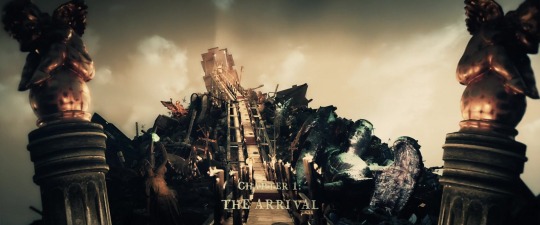

In the Gabriel’s cross meta, I already mentioned the importance of Ponte Sant’Angelo in relation to the ex-Archangel’s statue. Now it’s time to widen our perspective and focus on the full picture — quite literally. Apparently the bridge from the opening sequence has ten statues of angels, exactly as the Italian historical monument.
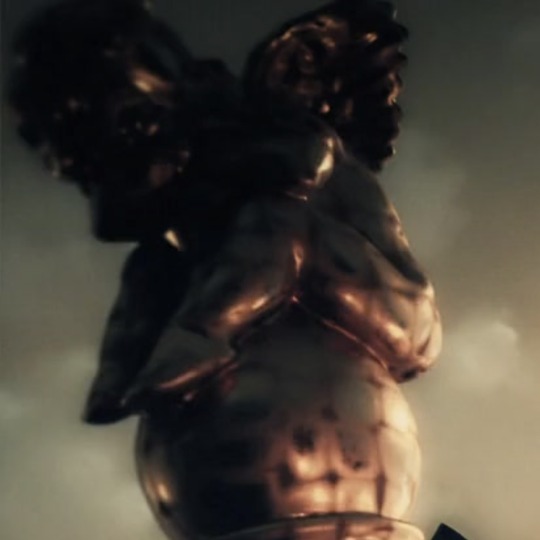
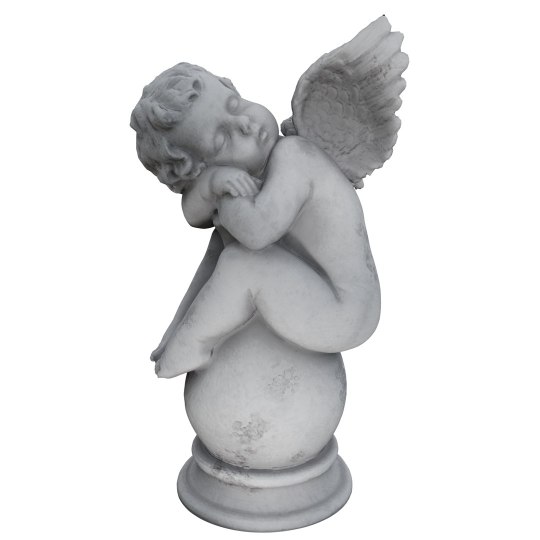
First things first though: the two big cherubs guarding the entry to the bridge might seem familiar to some of you. While they’re obviously not copies of the same statue, a very similar pair of brass cherubs is placed in Aziraphale’s bookshop to symbolize Aziraphale and Crowley. And looking at the screenshot above and the way they sleep or sulk with their backs turned on each other, they are most certainly not talking. The addition of more than one set of eyes is a lovely reference to biblically accurate angel memes though.
If we assume the traditional left-right positioning of the characters, Aziraphale is on the left and Crowley is on the right. Directly behind Aziraphale we can see a ship named “Good Traits”, but in reverse — kinda sorta confirmed by the animator Peter Anderson to be connected to the concept of the seven deadly sins on Twitter. Same that was mentioned recently by Neil in one of his asks.
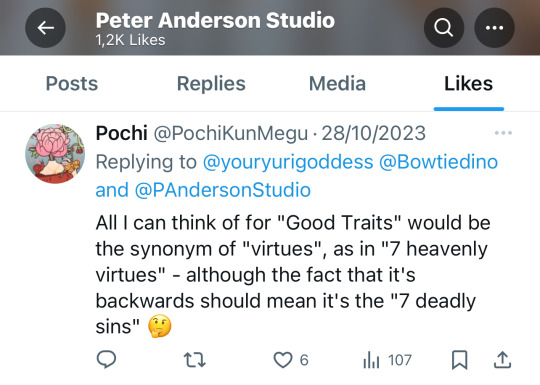
The presence of Gabriel — a renegade Archangel wielding a broken cross — on the right, Crowley’s side, seems to match this theory. It could also support one of the possible interpretations of the very last bookshop shot in the S2 finale.
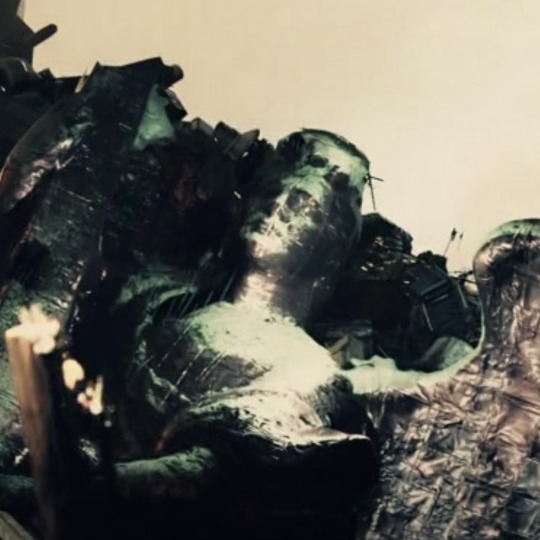
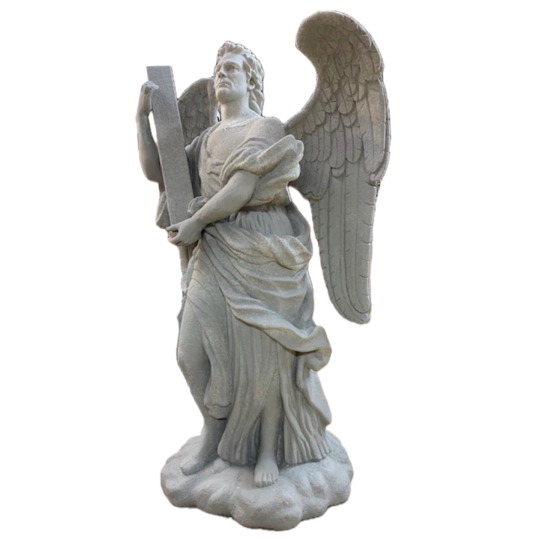
Out of all ten statues, Angel Carrying the Cross by Ercole Ferrata is considered inferior to the others on the bridge in that it appears to be a two-dimensional relief sculpture rather than an unbounded three-dimensional artwork, which seems to match Gabriel’s first impression as a character.
The inscription on the statue reads, “Dominion rests on his shoulders" — that is the weight of the cross that Christ was forced to carry through Jerusalem before being crucified. Even though Gabriel’s burden partially disappeared, the whole bridge and its environment is covered with crosses. It’s clear that we’re looking at a direct parallel of Via Crucis, the Way of Sorrows.
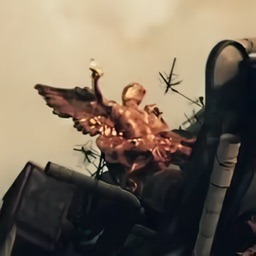
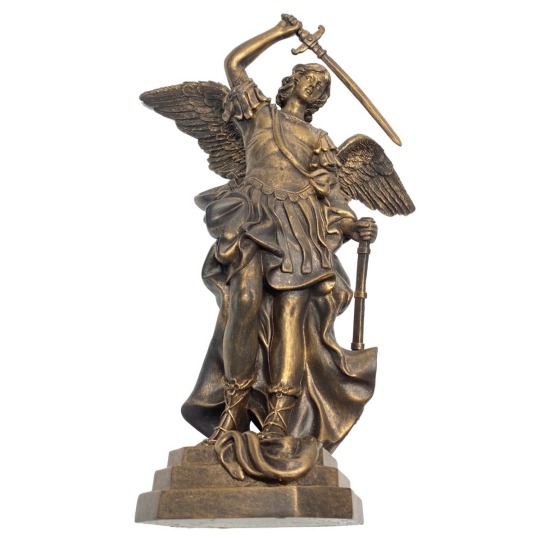
Towering over the Italian bridge, at the very top of Castel Sant’Angelo, is a statue of Archangel Michael, seen as the golden angel on the top left part of the trash pile. Aziraphale’s side, perhaps as his assistant, perhaps a rival? Legends of the Jews mention Michael as the chief of a band of angels who questioned God's decision to create man on Earth. The entire band of angels, except for Michael, was condemned to Fall — which could explain why they have such a good access to the Grapevine That Obviously Doesn’t Exist. And whatever’s going on between Michael and Dagon, perhaps.
In Roman Catholic teachings, Michael has four main roles or offices. Their first role is the leader of the Army of God and the leader of Heaven's forces in the final triumph over the powers of Hell. Viewed as the angelic model for the virtues of the spiritual warrior, their conflict with evil taken as the battle within. The second and third roles of Michael deal with death. Their second role is that of an angel of death, carrying the souls of Christians to Heaven. Michael descends at the hour of death and gives each soul the chance to redeem itself before passing; thus throwing the devil and his minions into consternation. In their third role, Michael weights souls on perfectly balanced scales they are often depicted with as their attribute. In their fourth role, Michael appears as the guardian of the Church. Might be the reason why they’re the closest to the building on top of the mountain.
It looks like Michael lost their sword though, just like Gabriel lost a part of the cross he was supposed to carry. The sword in question was supposed to be used to slay the dragon — Satan, the Adversary — according to John of Patmos and his Book of Revelations.
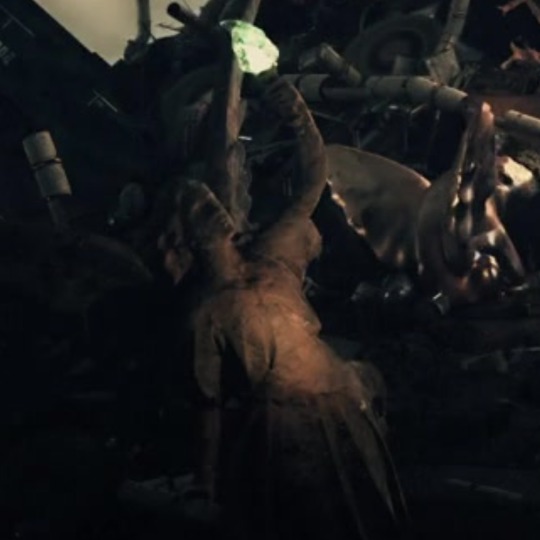
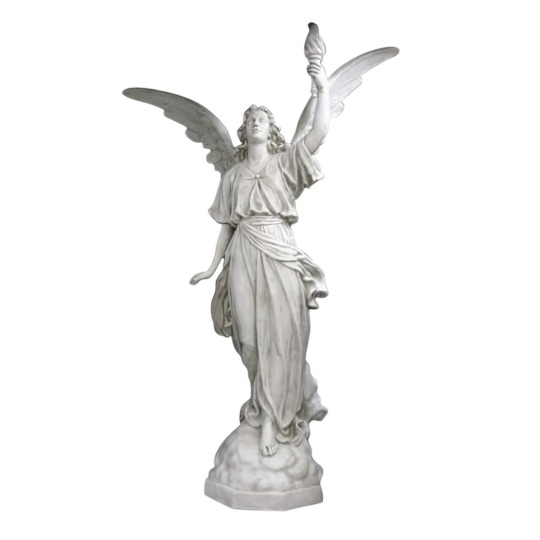
Speak of the devil: interestingly, there are two copies of an anonymous variation of the Angel of Light statue appearing twice on both sides of the bridge. Both the title as well as the statue itself seem like obvious references to one (former) angel literally called the Lightbringer, Lucifer. Perhaps one of them is representing his son, the Antichrist, instead, with the both of them helping out the Ineffables on two opposing — or perhaps only parallel — sides of the bridge?

The light carried by Lucifer appears to be green, a color used in the series as a visual representation of Hell, but on the intertextual level might also serve as a reference to F. Scott Fitzgerald’s classic novel The Great Gatsby and the green light at the end of the Daisy’s dock symbolizing the undying love, desperation, and longing for an unattainable dream. In the story, the color represents the limitations of power and money. Not surprisingly, the novel appears on Jim’s bookshelf and is part of the Good Omens book club — a list of personal recommendations from Neil Gaiman and Douglas Mackinnon for the fans to catch up on before the next series.

Last but not least, the possible connection to Libertas as the inspiration for the Statue of Liberty, shown multiple times in S2 as a foreshadowing of our character’s trip to America in S3. The related quote of Patrick Henry “Give me liberty or give me death” becomes even more relevant if we consider how the motto of the French Revolution was sometimes written as Liberté, égalité, fraternité ou la mort (“Liberty, equality, fraternity or death”). A lesson surely learnt by a certain angel back in 1793, when he was held prisoner for the last time before being forcefully taken Upstairs in the Final Fifteen.
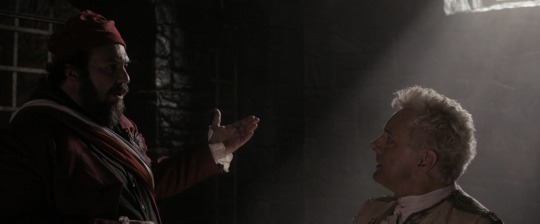
The bridge and the castle
Okay, these are the basic observations. Now a brief historical overview and we will reach the fun bit in a jiffy.
Have you ever wondered about the meaning of this whole complex? It wasn’t always angelic, but named after a Roman noble dynasty. The Aelian bridge was built by the Emperor Hadrian in 134 AD to span River Tiber from the city center to his mausoleum. With time, the remains of more emperors were put to rest in there, until it was plundered and destroyed in a war. Then the remaining structure was transformed into a military fortress and a castle serving as the papal residence in times of war.
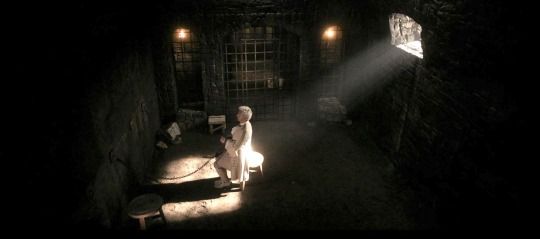
The Papal State also used Sant'Angelo as a prison; the Renaissance philosopher Giordano Bruno was imprisoned there for six years. Executions of the inmates were performed in the small inner courtyard, but they weren’t the only deaths in the area. On the other side of the bridge, in the adjoining Piazza del Ponte, under the watchful eyes of the stone likenesses of two saints, the public executions were held, and the heads of the criminals were brought onto the bridge and exposed to public view there.
As a prison, the former mausoleum is also the setting for the third act of Giacomo Puccini's 1900 opera Tosca. Long story short, the eponymous heroine convinces her lover to feign death so that they can flee together. Unfortunately, they are betrayed and the firing squad shoots at him with real bullets instead of blanks. Tosca believes in the quality of his acting performance rather than the truth, and when the realization hits her, she leaps to her death from the Castel’s ramparts.
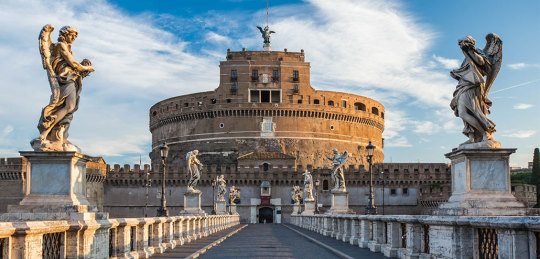
After Nero’s bridge was destroyed, the travelers were forced to cross this bridge as the only direct route to the Vatican and St Peter’s Basilica, earning it the nickname “the bridge of Saint Peter”. That’s why in the 16th century Pope Clement VII erected statues of Saints Peter and Paul at the ends of the bridge, guarding it as they are supposed to protect the entry to Heaven.
In 1688 the bridge was embellished with ten angel statues, five on each side of the bridge, carrying Arma Christi, the Instruments of the Passion. The Good Omens characters represented by those statues in the opening sequence might be other instruments of Christ’s suffering as parts of the system that needs to be overthrown or replaced.
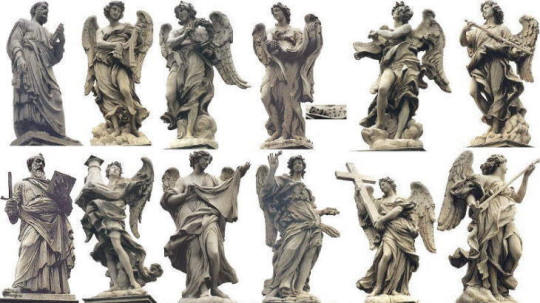
One angel appears particularly important in the context of both the bridge and the Second Coming — Saint Michael the Archangel.
Legend holds that the Archangel Michael appeared atop Hadrian’s mausoleum, sheathing their sword as a sign of the end of the plague of 590, thus lending the castle its present name. A less charitable yet more apt elaboration of the legend, given the militant disposition of this particular Archangel, was heard by the 15th-century traveler who saw an angel statue on the castle roof. He recounts that during a prolonged season of the plague, Pope Gregory I heard that the populace, even Christians, had begun revering a pagan idol at the church of Santa Agata in Suburra. A vision urged the Pope to lead a procession to the church. Upon arriving, the idol miraculously fell apart with a clap of thunder. Returning to St Peter's by the Aelian Bridge, the Pope had another vision of an angel atop the castle, wiping the blood from his sword on his mantle, and then sheathing it. While the Pope interpreted this as a sign that God was appeased, this did not prevent Gregory from destroying more sites of pagan worship in Rome. In honor of the vision and Michael, the bridge was renamed in their name.
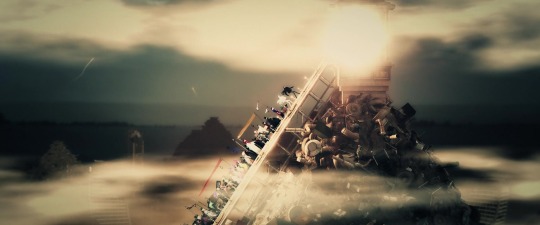
What if the procession from the opening sequence was meant to imitate the procession led by the Pope from the legend? What if Aziraphale, now officially a Supreme Archangel, Commander of the Heavenly Host, is the one actually leading it, with Crowley finally at his side as his partner and second in command, just like it was proposed by him in the Final Fifteen?*
What if by some reason, maybe personal ambition, maybe just a tragic coincidence or situational necessity, there really was an impostor in Heaven, and Metatron — the so called Voice of God who seemingly doesn’t speak up for Herself since Job’s test — has been playing a winged version of the Wizard of Oz all along?
It would make just the perfect sense if not for one tiny detail. The procession we see on the bridge is actually led by Crowley, which doesn’t fit the parallel at all — unless it’s actually a proof of an ongoing body swap, as the mismatched names of the actors could also suggest?
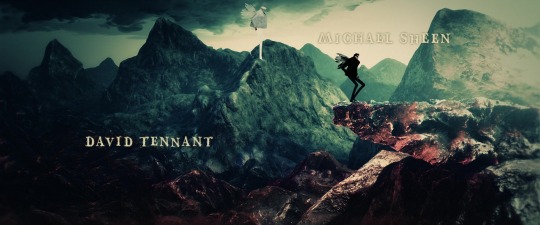
The mountain of trash and the bookshop
The symbolic mountain of trash we can see Aziraphale and Crowley climb is a reference in itself. To an actual mount called Zion, believed to be the place where Yahweh, the God of Israel, dwells (Isaiah 8:18; Psalm 74:2), the place where God is king (Isaiah 24:23) and where God has installed king David on his throne (Psalm 2:6).
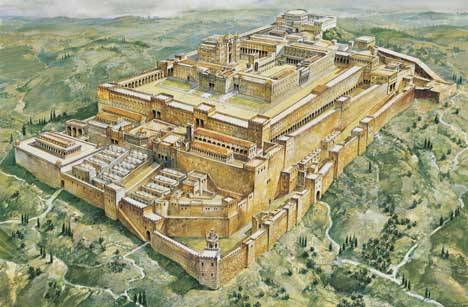
In a literal sense, it’s a hill in Jerusalem, although the sources refer to three different locations in different contexts — although for the purpose of this meta the Upper Eastern Hill (Temple Mount) makes the most sense. Its highest part became the site of Solomon's Temple. The same King Solomon the rituals in Freemasonry refer to. Masonic buildings, where lodges and their members meet, are sometimes called "temples" specifically as an allegoric reference to King Solomon's Temple, not actual places of worship. And Aziraphale’s bookshop is built around Solomon’s Magic Circle.
In a metaphysical sense, and especially in the context of the Christian New Testament, it is also believed to be a part of Heaven — the heavenly Jerusalem, God's Holy, eternal city. Christians are said to have “(…) come to Mount Zion and to the city of the living God, the heavenly Jerusalem, to an innumerable company of angels, to the general assembly and church of the firstborn who are registered in heaven” (Hebrews 12:22-23 cf. Revelation 14:1). Just like the procession were following in the opening sequence.
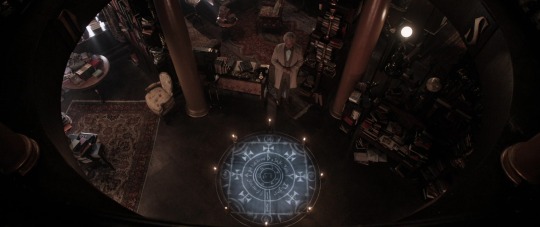
There’s been some speculation whether the lift on top of the mountain could symbolize Aziraphale’s bookshop, or, more specifically, the oculus in its centre. If you look closely at the enhanced screenshot, you can see that the dome isn’t made of glass and that it looks like a tower (a church’s bell tower, perhaps) more than a whole building.
And there is an actual doorway in there — not like the modern lift doors — opening up towards the source of that white, heavenly light. And what kind of enlightenment can you usually find up in the skies or heavens?

We’re welcomed to crack open the doors to the Heavenly Sanctuary — the Most Holy place, Sanctum Sanctorum, the Holy of Holies — to undraw the final curtain and finally stand eye to eye with God. Who knows, maybe even ask some questions or listen to some answers.
Or, at the very least, to meet one of Her forms known as Jesus Christ. Because that’s precisely where he serves as our (humanity’s) Mediator and the Holy Priest after his Ascension to Heaven. The structure at the top reminds of some temple architecture seen in Antiquity and Christianity.
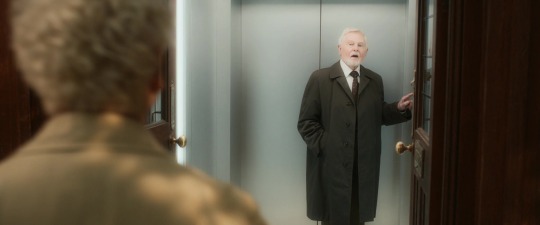
The Catholic Church considers the Church tabernacle or its location (traditionally at the rear of the sanctuary) as the symbolic equivalent of the Holy of Holies, due to the storage of consecrated hosts in that vessel and their meaning as the Body of Christ. Tabernacle is commonly marked with a red light turned on and off depending on His presence or lack if it.
Looks like He’s already in the area, one way or another, keeping eye on some things.
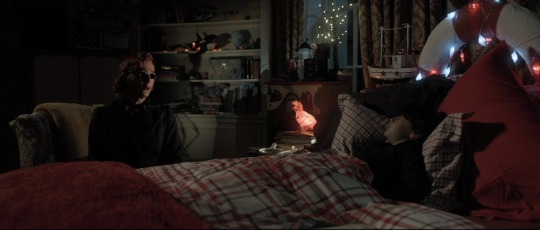
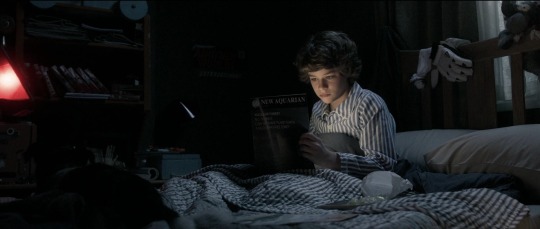
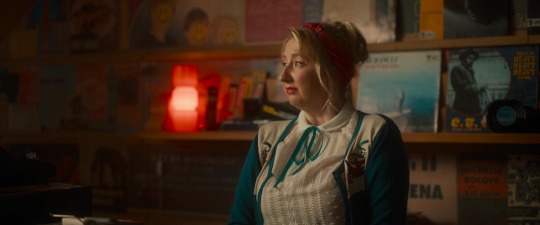
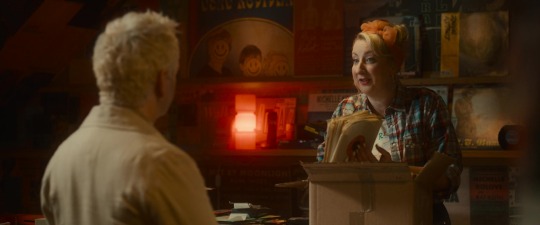
Are we following a procession of believers happy to embrace their one and true Savior? Or are they actually protesters on their way to dethrone the authority and the system?
Guess we will have to wait and see.
#the good omens crew is unhinged#everything has a meaning#title sequence#angels everywhere#archangel fucking gabriel#gabriel’s statue#bookshop statues#statues update#ponte sant’angelo#let there be light#good omens analysis#good omens meta#bible fanfiction#yuri is doing her thing
134 notes
·
View notes
Text
“What did you do?” Adam asked.
Cain—his first born, the first ever born—looked at him with eyes wide and terrified. Adam’s eyes, Eve would say, the same brown of rich, rain-watered soil.
“I don’t know,” Cain said. “I don’t- Dad, I don’t know. Why won’t he wake up?”
Cain’s lip trembled, hands clasped tightly together, tears welling and falling in great fat drops. He was still so young, younger than Adam had ever been. His knees were knobbly and his wrists thin and he barely came up to Adam’s chin. Big enough to work, to till the fields and pull the weeds and harvest the crops, but small enough to curl tight in his mother’s arms when lightning cracked the sky.
On the ground was Abel, even younger yet. He tended the flocks and kept watch for anything that might want to harm them. He was good with them—gentler than Adam understood, though Eve told him to let him be. Even now several sheep creeped closer, braying nervously at the sharp scent of iron.
Abel was still shorter than Eve. He had a gap in the far back of his mouth where the last of his molars had popped out only a handful of days before. He had freckles that showed up in the summer sun, as if he had grown them there, all over his face and shoulders and arms.
“Dad, what do I do? What can I-?”
Abel’s eyes were open, looking to the sky that they so resembled, but they didn’t see anything. Somehow, Adam knew. Abel wouldn’t see anything ever again.
Adam hadn’t known that they could die. Humans, that was. Adam hadn’t known that Humans could die. How could he?
He’d suspected, of course. He bled when he was cut just like the animals he’d learned to butcher for their fat and meat and skin. He grew weak when they had little food to come by, they all had fallen ill a time or two, he’d watched as Eve lost what would have, otherwise, turned into a child. It wasn’t a shocking conclusion to reach, but he’d never known for certain. Not like he did now.
Adam fell to his knees, hands helplessly cradling Abel’s face. His son, his body, his baby-
There was so much blood, comign from the cracked-open place in Abel’s brown hair. It dyed his curls slick black, spilling down his neck. The soil was covered in it. This place would be stained for days—weeks, maybe even months—just as the place they slaughtered the livestock was marked as a place of death.
“I’m sorry. I don’t know what to do. I’m sorry.” Cain was sobbing, hiccuping over his words and gasping for breath.
Adam’s vision was blurring as his own tears came. Abel’s face felt rubbery and wrong underneath his hands. Lifeless.
This was wrong. This shouldn’t have happened. This should never happen. Abel was so young, had so much more to live. He would keep growing—maybe until he was taller than not only his mother but Adam too—and he would continue to tend the flocks like personally tending to the lambs that fell ill with sudden weakness and some day he would have his own children because that’s how it worked, how God had told them it worked and He never lied.
“D-Dad, say something, please. Daddy, say something!”
Cain was his son, too. The first Human ever born when Adam and Eve still struggled to provide even the most basic needs for themselves. He was a good boy—always so helpful, always so smart. He knew when food ran low, when the well pulled up dry, when the hearth burnt out, that it wasn’t easily fixed and so he didn’t complain and tried his hardest to make it better, somehow. He was a good son.
So why had he done this?
“What happened?” Adam asked, still looking at those glassy blue eyes.
“I-” Cain stuttered, like he didn’t expect to be asked. “We went to bring out sacrifices to God. I brought what extra I had grown and Abel slaughtered a goat—the little one, with the limp. God accepted the goat but He…He said I was to do better.”
God was like that sometimes, Adam knew. He didn’t know why, maybe He just liked meat better than grains and fruit.
Each time they had to butcher even a chicken Abel got—had gotten—upset. When they slaughtered the goats and sheep and cattle he always cried, but they needed to eat and God needed to be praised and worshiped.
“He- He always says that, but I give Him everything. I’ve always set aside the sweetest fruit, the finest wheat, the very best of the lot. I make sure to give Him everything Mom thinks we can spare—sometimes even more because I don’t want to disappoint Him.”
Cain sounded desperate. Like he needed Adam to understand.
“What happened?” Adam repeated. His voice thundered, and he saw Cain’s feet stumble back. Some part of Adam was distraught at having incited such a fearful reaction, but some other part nearly reveled in it.
“I was just so angry,” Cain said, sounding miserable and defeated and small. “It isn’t fair Abel is always getting praised when he’s choosing the weakest and worst of what he has. I didn’t…I wanted him to hurt but not this badly.”
“Wasn’t,” Adam said.
He was shaking, but not from cold or fear. Rage coursed through him like it never had before—not even when Lilith left him, or when he’d bitten into the Fruit and understand what they had just been tricked into doing, or when God had cast them from Eden.
“What?” Cain asked. He still sounded so small, like he was Seth’s age instead of nearly fifteen. Maybe even younger than that.
“It wasn’t fair. Abel was getting praised.”
“No! No, Dad, he isn’t- I didn’t-”
He understood what he’d done. He probably had since the very start, or close to it. He was never stupid.
“He is,” Adam said, and finally looked at Cain.
Cain looked lost. Frightened, in many ways, like every single thing he knew had been upended and scattered. Adam…couldn’t feel much of anything.
“He can’t be,” Cain said, a plea like a prayer. “I didn’t mean it.”
“He is. He’s dead. You killed him.”
“No,” Cain wept. “No!”
Adam was standing. His hands were covered in his son’s blood, his son who lay dead on the ground at his feet. Cain shrank away from him, like-
Like he was afraid Adam might kill him.
“Leave,” Adam said.
Cain sobbed. “No, Daddy, please- I didn’t know! I didn’t know!”
“Leave!” Adam shouted. “You killed him! Get away from here, get out!”
Cain tripped over his feet, scrapped a knee and both palms in the dirt. And then he ran.
Adam watched until he left the field they had tended together, that Adam had first sowed when Cain was first learning to wobble on chubby legs. He watched as he tore through the brush and sharp brushes, until he lost sight of his hair and brown tunic, until he couldn’t hear him in the forest. He stayed there, staring off into the space where he had gone, until a small lamb brayed near his feet.
The creature had crept closer to him and its fallen favorite master. It bleated at the boy crumpled to the earth, clean white wool coming nearer and nearer to being stained by the blood congealing in Abel’s clothes.
“Fuck,” Adam said. His boy—his boys. Cain and Abel, the first two and then only two for several grueling years. One always coming right after the other.
Hadn’t Eve seen this coming? Had a dream so terrible it woke her in the night with a start so strong it had woken Adam, too? She’d begged him to help them, their two eldest children, to prevent the animosity she knew was brewing.
Adam hadn’t believed her, not really. The boys adored each other, it was plain as day to see. Still, she had insisted and it wasn’t that bad of an idea to separate their area of work. Perhaps it would be best, in the long run, for Cain to know as much as he could about farming the earth and for Abel to know how best to tend to their animals. A downright practicality. Up until this moment, had Eve come to him again with her concerns, he didn't think he would have believed it.
Even now, even after all this…he couldn’t actually believe that the two hated each other. Certainly not their sweet, gentle Abel and their thoughtful, dedicated Cain. Not when the roughest tumble they’d gotten into before had only resulted in bruises because they’d accidentally fallen from the river bank they’d been walking near. Not when Adam had watched Cain rise from the bed he and Abel shared with their youngest brother, delicately extracting himself from the tangle of limbs so as to not wake the others, only this morning.
“Fuck!” Adam yelled, tears falling hot and fast.
It was frighteningly easy to gather Abel into his arms. To carry his limp little body back to the house—back to his bed, his mother, their hearth.
“Adam?” came Eve, as he entered their little yard. “What- no, no!”
She must’ve thought he was carrying something else, at least for a moment, but the instant she realized her scream was shrill enough to send the chickens flying to the trees.
“No, no, my baby, my baby,” she cried, running to Adam as if she could take the weight all unto herself. “No, please, this can’t- oh!”
From where Eve had come was Seth, only seven and still little enough to cling to his mother’s legs when uncertain. He looked very much like he would like to do just that, now, old enough to understand that he wouldn’t be able to. Not when Eve wept as she did, not when Adam’s face was wet, not when Abel was limp and Cain was nowhere to be found.
Eve crumpled to her knees, taking Adam down with her. Her arms crossed beneath his. Between them they cradled Abel, so small and so young and so very dead.
~~~
A/N: Full disclaimer I did in fact write this because I watched Hazbin Hotel. Yes, it did surprise me that such a stupid little show (that I have semi-complicated opinions about but did enjoy watching) inspired something like this. I don't think it's strongly related to Hazbin Hotel in any way, though it could be if I was actually interested in expanding it (and I'm not really). There is non-negligible impact from Supernatural and Good Omens in this as well.
#adam and eve#cain and abel#religious trauma#ex catholic#my fic#my writing#call it an original work if yall want idk#I could put this on ao3 but idk what 'fandom' it would be under#honestly i am leaning original work at this point#tw miscarriage#tw character death#tw religious themes#religious imagery#bible fanfiction#because that's a tag#hazbin hotel#hazbin hotel adam#supernatural#good omens#or any of those other religious trauma packed shows
125 notes
·
View notes
Text
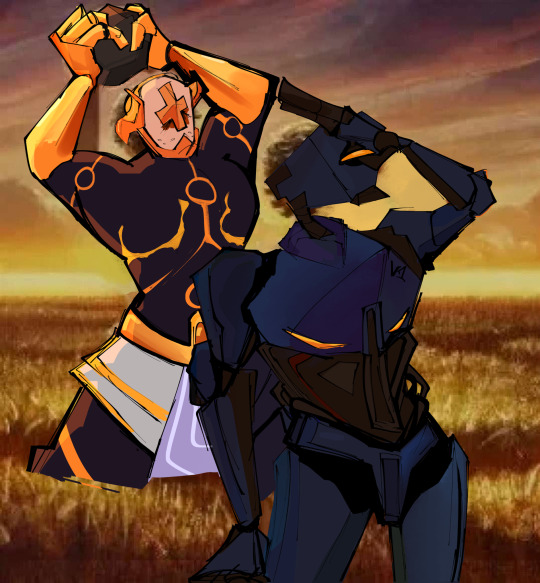
NOTHING IS FUN ANYMORE!!!!
Throwing rocks at the machine:

#digital art#art#ultrakill#ultrakill fanart#ultrakill game#ultrakill gabriel#gabriel ultrakill#ultrakill v1#v1 ultrakill#ultrakill sex update#gabriel judge of hell#bible fanfiction
622 notes
·
View notes
Text
Some Christian Lore I think will be important for GO S3
I don’t think there is gonna be a baby Jesus y’all… theories that Maggie is the new Mary or Aziraphale will show up with a baby on Crowley’s doorstep fail to take into account the actual Christian myth and lore
Jesus rose from the dead and ascended BODILY into Heaven. According to the Gospels and Revelation that same embodied Jesus is returning to Earth.
And Neil is like A SCHOLAR for religion, he knows these stories.
So I’m just throwing out there, while we are all theorizing, that we are probably getting a 33 year old Jesus coming to Earth and having NO IDEA how Earth works since he was last here >2000 years ago. (I could be wrong)
So im thinking more like George of the Jungle film where Brendan Fraser is Jesus and Leslie Mann is Aziraphale; a fish out of water / man outta place comedy
327 notes
·
View notes
Text
I think people are forgetting one of the most consequential kisses in the Bible when analyzing the Good Omens kiss.
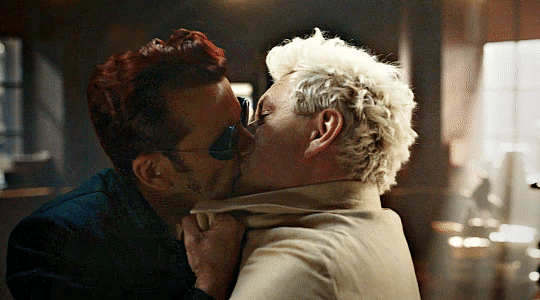
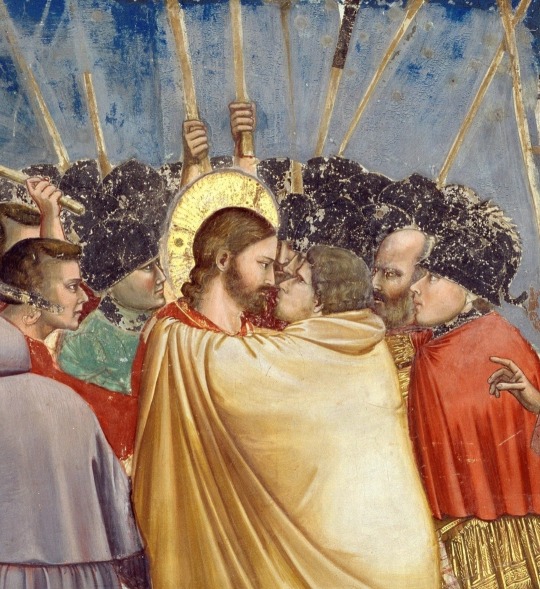
The kiss of Judas.
While I don't think anyone is going to be crucified, I'm just surprised I haven't seen anyone mention this yet. I'm not passionate enough about this to write out a whole analysis, but the roots of "betrayal" are there.
But who has betrayed whom?
Anyway, fingers crossed for a happy ending for these two.
#good omens spoilers#good omens season 2#neil gaiman#good omens#aziraphale#crowley#the kiss of judas#bible fanfiction#rip Jesus#go2#go2 spoilers#go2e6#mp
315 notes
·
View notes
Text
Coffee theory, Lie theory, Body-swap theory, Az has trauma theory—-
I propose my good people: ALL OF THEM
S2 Good Omens Spoilers ahead as well as s3 predictions
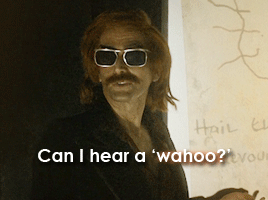
Let’s start with the first and most common: the coffee theory.
Coffee theory is simply that Metatron did something to Az’s coffee to make him agree to leave Crowley and go up to heaven.
Now there is no denying that coffee has played a suspiciously conspicuous role throughout this season. From the coffee shop (oh we will come back to the coffee shop at the end my friends, don’t you worry), to Crowley’s espresso order, to Metatron’s suspicious offering, and the coffee cup making an appearance in the opening sequence.
I am never one to cast aside what writers are so obviously trying to shove in an audience’s face.
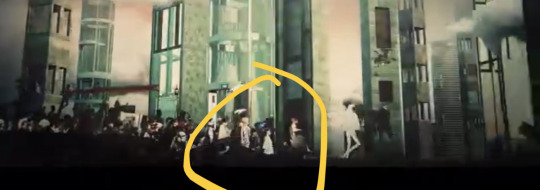
Do I think that Metatron drugged Az’s coffee in some way? Not really no- I believe coffee might be a symbol for sun here, almost Az’s own Apple as it were.
Throughout the show we have never seen Az drink coffee, only Crowley and humans, both of who are capable of sin. (Also Crowley chugging down 6 shots?). Az drinks tea (unspecified) and offers hot chocolate, but never coffee.
Coffee has no biblical ties- BUT in LSD/Mormonism has a rule against it.
This stance dates back to 1833, when Joseph Smith Jr., the founder of the Church, received what he called “a revelation from God” that said: “hot drinks are not for the body or belly.” -source
Shortly after this “rule” it was updated to allow herbal teas, and in modern times hot chocolate.
Now why would a Mormon rule apply here possibly? Because I believe it may apply to s3. The initial planned sequel to the book has been said to pertain to the second coming of Jesus in America.
After Jesus' resurrection, according to the Book of Mormon, he visited America. In fact, America plays a special role in Mormonism. Mormons believe that when Jesus returns to Earth, he will first go to Jerusalem and then to Missouri. -source
The Book of Mormon references Jesus visiting America- and I don’t think the writers would make one silly tie in and just leave it at that. If we’re saying they’re right on one prophecy, why not add this to it?
I find it silly and impossible to believe that our little human food lover has had it all but was unfamiliar with how espresso would effect him. I also find it highly suspicious how much of the marketing revolves around the beverages our characters drink.

I do believe there is also stock in the almond syrup as everyone else has pointed out.
In context, God had just given Israel a warning. “I have this day set you over the nations and over the kingdoms, to root out and to pull down, to destroy and to throw down, to build and to plant.” (Jeremiah 1:9-10) Then after Jeremiah sees the almond tree, God shows him a boiling pot over Jerusalem which portends “calamity”. (Jeremiah 1:13-14) While the almond is a sign of hope that God will eventually fulfill His wonderful promises to Israel (or to us), the context is more ominous. Later, God repeated the warning through Jeremiah: “Behold, I will watch (shaked) over them for evil, and not for good…” (Jeremiah 44:27). God’s message to Israel was that sin has consequences and there will come a time of reckoning – namely the destruction of Jerusalem and the captivity of Israel. Years later, Daniel would pray: “Therefore has the Lord watched (shaked) upon the evil, and brought it upon us: for the Lord our God is righteous in all His works which He does: for we obeyed not His voice.” (Daniel 9:14) -source
That last bit really gets me because Metatron is the voice of god as we know. So the coffee is a combo threat as well as a type of temptation, like the apple. (“Are you going to take it?”) We know that in the s2 opening we see Adam’s (of the garden variety) grave and we are supposed to learn about his death in s3. I think Az falling to temptation will tie into all that.
Back to the moment in question- a lot of people pointed out a miracle sound occurring faintly when the Metatron handed over the coffee. It’s been floating around that this was him doing something to the coffee .
I disagree- I think that was Crowley protecting Az. We don’t see him immediately in that shot- and him being on the other side of the room would be why it was so faint. Metatron’s glare wasn’t one of pure dislike- he sensed something then and was suspicious.
Crowley is overprotective on a good day- but he knows Metatron and does not appear to hold and fondness to him. I think he knew no good was to come from the conversation and wanted to protect Az of anything that could occur. So the coffee didn’t actually end up effecting him at all.
All that summed up to say: coffee theory doesn’t tell us why Az does what he does- but it does tell us why Metatron thinks everything is working out in his favor.

Next up! Az is just traumatized theory
It has been pointed out that Az’s decision in this moment is actually pretty on brand for all that he’s been through. And I would agree!
Of course he wants to be in heaven’s good graces, of course he wants to fix the world-save the humans- overhaul the system, of course he is still seeking validation.
That’s why when offered the position he jumps at it! No mind inducing coffee needed like the Metatron had thought. It’s just that what Metatron doesn’t know is that Az is agreeing with his own motives in mind. He wants to make a world safe for humans, he wants to make a reality safe for him and Crowley, and he wants to come back to his bookshop at the end of it all.
All that summed up to say: Az trauma theory tells us why he decided to take this path- but doesn’t explain the offer itself (coffee theory did that), or why he presents it the way he does
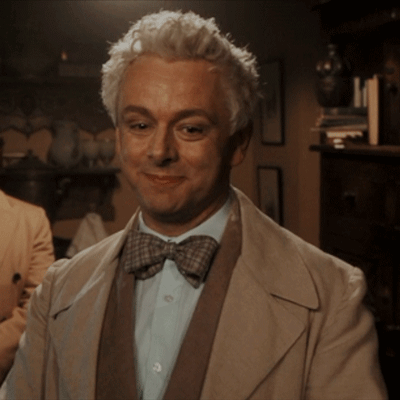
Next: The Lie Theory
This theory comes based around the idea that Az is lying to both Metatron and Crowley.
This season taught us something very crucial about angels in general and our favorite, Az. It showed us that angels are not supposed to be able to lie- and that Az willingly does on multiple occasions.
Lying is definitely a big deal in the Bible. It is one of the Ten Commandments in fact.
One of the Ten Commandments is "thou shalt not bear false witness against thy neighbour"; for this reason, lying is generally considered a sin in Christianity. -source
It is no small thing that Az commits this sin- although I’m sure he puts himself through all sorts of mental gymnastics to do so. From what we can tell, he only does so to protect. In this case, we can assume he is trying to protect Crowley.
The lie in theory is that during the secret conversation with Metatron, some sort of threat against Crowley may have been made or that Az simply needed to figure out a way to drive Crowley away from him (or possibly goad him).
So when Az is telling Crow that he can be an angel again, this is a lie knowing that he would never go for it. Then when he reports back to Metatron he lies (by omission) what he actually relayed over to Crowley.
Why such a harsh lie though? Why hurt Crowley so deeply- surely there are other ways to push him away from danger.
Because he was trying to goad him- he was trying to rile him up.
So to summarize: The Lie theory tells us why Az delivers his news how he does- but not to what end

Now: The Bodyswap Theory
Bodyswap theory is essentially that Az and Crow switched bodies again during the kiss to go about and solve the issues at hand.
Now we know from s1 this is possible- but I don’t exactly think that’s what happened. We learned this season that angels also appear to have the ability to store memories or consciousness ~elsewhere~ and that both of these seem to require physical contact to occur.
What I believe happened here was that Az transferred some sort of information to Crow (a memory- what happened in the conversation-etc). That’s why kiss was, uh, not quite so quick and chaste and why Az was goading Crow in the first place. Also possible Crow transferred some knowledge (or abilities) back.
We have seen that Crowley is actually rather easy to rule up- and that Az has succeeded in doing so multiple times.
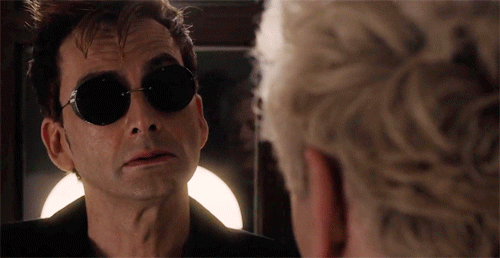
I don’t think Az was expecting a kiss (poor soul)- but he was expecting to be grabbed or something.
To summarize: Bodyswap theory explains why Crowley didn’t immediately burn the world to the ground
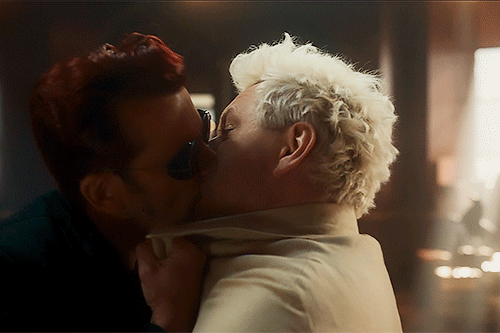
Now looking ahead to s3 and my own silly theories off of all of this. Aka: gentleman start your engines theory
This theory will hopefully explain those last few painful moments.
“I forgive you”
“Don’t bother”
For what? The kiss? The not going to heaven? All of it?
No- for what Crowley is about to do. Aka raise hell on heaven.
Whatever information Az passed along- Crow’s response was some sort of inkling of a plan towards destroying heaven and the system as we know it. A revolution of sorts.
The revolution has been hinted at since the end of s1- ever since our precious coffee shop sprang into existence (told you I’d get back to it).
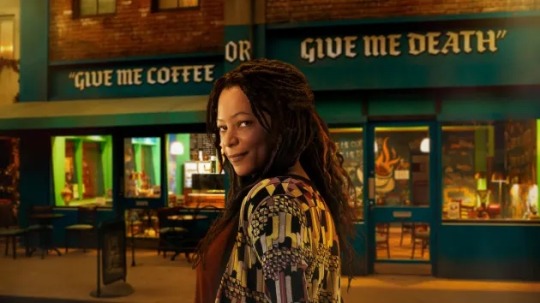
The quote that the title of the shop is referring to is “Give me liberty or give me death,” from founding father Patrick Henry’s famous speech credited with swinging public favor to join the American revolution (America, the convenient location of our second coming) during the First Virginia Convention at St. John’s Church.
I know of no way of judging of the future but by the past. And judging by the past, I wish to know what there has been in the conduct of the British ministry for the last ten years to justify those hopes with which gentlemen have been pleased to comfort themselves and the House. Is it that insidious smile with which our petition has been lately received? Trust it not, sir. Suffer not yourselves to be betrayed with a kiss. Ask yourselves, are fleets and armies necessary to a work of love and reconciliation? Let us not deceive ourselves, sir. These are the implements of war and subjugation; the last arguments to which kings resort. I ask gentlemen, sir, Has Great Britain any enemy, in this quarter of the world, to call for all this accumulation of navies and armies? No, sir, she has none. They are meant for us: they can be meant for no other. And what have we to oppose to them? Shall we try argument? Sir, we have been trying that for the last ten years. Sir, we have done everything that could be done to avert the storm which is now coming on. We have petitioned; we have remonstrated; we have supplicated; we have prostrated ourselves before the throne, and have implored its interposition to arrest the tyrannical hands of Parliament. Our petitions have been slighted; our remonstrance’s have produced additional violence and insult; our supplications have been disregarded; and we have been spurned, with contempt, from the foot of the throne! In vain, after these things, may we indulge the fond hope of peace and reconciliation? There is no longer any room for hope. If we wish to be free, we must fight! I repeat it, sir, we must fight! An appeal to arms and to the God of hosts is all that is left us! It is in vain, sir, to extenuate the matter. The war is actually begun! Our brethren are already in the field! Why stand we here idle? Is life so dear, or peace so sweet, as to be purchased at the price of chains and slavery? Forbid it, Almighty God! I know not what course others may take; but as for me, give me liberty or give me death! -source
Another fun historical fact- this church also helped pave the way for religious freedom in America. (But also had a very messy history).
It is notable that the Second Virginia Convention authorized Baptist chaplains to minister to soldiers, an important early step toward freedom of religion in what became the Commonwealth of Virginia. Baptists and Methodists had been influential in Virginia during and following the Great Awakening, and many of the common people had already become affiliated with Baptist and Methodist congregations. -source
We also what seems to be a militia of sorts marching to heaven in the s2 opener with all sorts of walks of life. This isn’t going to be the heaven vs hell war- it’s going to be a revolution.
We see repeatedly when Az forgives Crow it’s almost reactionary. He wants Crow to know he doesn’t condemn his actions (and therefore also agrees with them to some extent).
Crow says “don’t bother” not because he’s dismissing Az, but because the very system that the forgiveness is based on he seeks to overturn.
This planned revolution is also why we get the “no nightingales” line.
Now the: No Nightingales Theory
Now, we are meant to think it’s just a heartbreaking reference to the song “a nightingale sang in Berkeley Square” but it’s so much more.
Nightingales are mentioned one time in the Bible- well the Old Testament has them at least, in the Song of Songs.
"Behold the autumn has passed, the rain has gone, blossoms are seen in the Land, the time of the nightingale has come, the voice of the turtledove is heard; the fig has formed its first fruit; the vines in blossom give forth fragrance", Song of Songs 2:11-13. These verses describe springtime in the Land of Israel. The rains have ended, the trees are in blossom and the nightingale has come. Israel is located on the migratory route between Europe and Africa, of so many birds, including the nightingale and the sweet sound of the birds can be heard from within the shrubbery. -source
The Song of Songs is described as, “a literary, poetic exploration of human love that strongly affirms loyalty, beauty, and sexuality. Yet in God's story, these things are not ends in themselves.”- Tom Gledhill.
Both this and the song “a nightingale sang in Berkeley Square” reference a nightingale symbolizing the coming of spring after winter.
Nightingales have a long history in British literature having a general theme of representing nature's purity, and, in Western spiritual tradition, virtue and goodness.
In Romeo and Juliet, they help represent the opposing sides of light and dark in love
In the same way that light and dark are mutually exclusive, Romeo and Juliet are like nightingales and larks, never able to be together. The lark, a bird of the morning (light), represents harsh reality, while the nightingale represents the safety of night (darkness). -source
In John Keats “Ode to a Nightingale” he references the battle between logic and passion- “The nightingale described experiences a type of death but does not actually die. Instead, the songbird is capable of living through its song, which is a fate that humans cannot expect. The poem ends with an acceptance that pleasure cannot last and that death is an inevitable part of life.” -source.
We also have this lovely tidbit from Izaak Walton’s (famous British author) essay.
But the nightingale, another of my airy creatures, breathes such sweet loud music out of her little instrumental throat, that it might make mankind to think miracles are not ceased. He that at midnight, when the very labourer sleeps securely, should hear, as I have very often, the clear airs, the sweet descants, the natural rising and falling, the doubling and redoubling of her voice, might well be lifted above earth, and say, “Lord, what music hast Thou provided for the saints in heaven, when Thou affordest bad men such music on earth?”-source
This references the shortcoming of heaven and the beauty of what sinners may find on earth again via the nightingale.
All this to say- Crowley’s “no nightingales” may be a way of saying “spring is not here, we are still in the trenches, I love you-but cannot protect you where you are going now.”
Still sad! But like- less break up sad, more the reality of the situation they’re entering sad.
Also- back to Walton’s piece- the questioning of god again—
Speaking of god… where is she
And finally: God is Dead- a not fully formed theory
Did anyone else notice god did not narrate this season? Not to go all “his dark materials” on y’all, but did someone kill god?
Odd artistic choice to just remove her so suddenly.
I just keep circling back to Metatron’s question in the coffee shop, “does anyone ask for death?”
At first I thought he was referring to Job- who’s story we got to tackle this season, as in the Bible he actually mentions asking for death several times.
But then it got me wondering- did god ask for death? If so was it because the ineffable plan failed?
Also the inclusion of Iain Banks, ‘The Crow Road’ that Metatron gives Muriel can’t be for nothing. (Spoiler of for book-but it’s loosely a murder mystery with a solid grappling with faith).
Part of me also wonders if Crow is suspicious of all this- just based off the faces he was making around Metatron. Also because of Gabriel just throwing everything away suddenly- and him referencing the second coming.
I don’t have a fully formed analysis of this theory- it’s just growing in my head.
ANYWAYS- in summary: Metatron tried to trick Az with the coffee, but crow protected him, and it wasn’t necessary anyways because Az has trauma, but still wants to protect Crow so he lied and riled him up to transfer knowledge, and Crow has decided to raid a revolution but is being a romantic drama queen about it, and god might be dead. :)
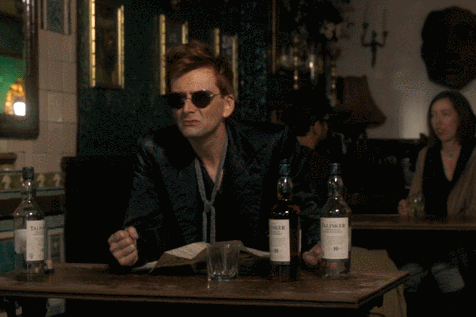
#good omens#good omens s2#ineffable husbands#ineffable idiots#aziracrow#aziraphale#crowly x aziraphale#crowley#metatron#coffee theory#lie theory#body swap#bible fanfiction#writers on tumblr#theories#amazon#gratuitous research#neil gaiman#go2#go2 spoilers#go2 speculation#michael sheen#david tennant#good omens season 2#good omens season two#good omens shitpost#good omens spoilers
158 notes
·
View notes
Text
cain being the first murderer…being a symbol of anger, rage, jealousy, and violence…i wonder what he felt moments after he bashed abel’s head in with a rock…not knowing his brother wouldn’t simply get up and have a bad bump for awhile…
when abel fell to the ground there was that feeling of vindictive victory…and then when abel didn’t move cain suddenly felt cold. blood pooled around his brother’s head in the green grass like a scarlet halo. his brother…sweet abel…grew pale. his eyes glazed over…
cain’s stomach churned. abel wasn’t moving. he wasn’t breathing. no but wait he didn’t mean for this to happen. he was angry, but he didn’t want this. please…please…
when god asked cain where abel was…what could cain say…he felt defensiveness immediately. lying, trying to come up with an excuse. of course god knew…he always knew.
and on that day eve lost two sons.
#bible fandom#cain and abel#scripture#bible posting#my religious traumatized mind thinks of cain and abel at least once a week#bible fanfiction#writing
48 notes
·
View notes
Text
When the human known to us as Christ arrived in the underworld, gods and shades alike were horrified. It was always a big deal when demigods arrived in the underworld, but this one had died so brutally, a young man, not even old enough to grow a beard, tourtued to death at the will of his own divine parentage, the blood dripping from his shade's hands.
The high gods of the underworld brought him up to their tower to figure out what happened. Christ had recoiled from them at first, thinking they were Devils, but had to take Anubis's hand to ascend the tower's steps, as his legs were badly wounded. The gods of the dead looked at him with both sympathy and horror, it was the first time a he had seen a god look at him with either of those emotions.
Hades swore that this was his brother's doing, but even then it crossed a new line. The description of a god impregnating a young girl in Bethlehem fit what Hades knew of Zeus, but to harm his own son in such a way, as part of a ploy to try to gain all of Rome for him alone, had proven his brother's reign growing darker. Still, he took mercy on the young man, promising him at least three days safety in the underworld without his father trying to claim him again. Hades wondered if the poor girl knew when she held her child that he was born to suffer and die, just as the mothers of great heros knew their destiny. Hades hoped Chrsit would have a chance to stay longer, his wife would return in the fall, and he had the same kind eyes as her, she would probably like to know him.
Hel came to comfort Christ once he had a chance to rest. She helped tend his wounds, and pet his head, and for the first time christ was held by a divinity that didn't expect anything from him. And she told him stories of her father to cheer him up after meeting with such a horrible fate. And she told him that no father should ever do such a thing as what his father had done to his child, that if she had known in time she would have saved him. And she let him be comforted as a human, instead of being a lord of all humanity. And for a momment he didn't have to be the son of god who felt alone while bleeding and dying, but the son of the carpenter Joseph who had been reminded of home when he felt the wood of the cross.
He wasn't allowed to stay, his father wanted him back, back to be the bleeding prince of a new and lonely kingdom. And the underworld wept for him, not because the underworld was deprived of Christ, but because Christ was deprived of the underworld.
#196#my thougts#worldbuilding#writing#my writing#my worldbuilding#urban fantasy#myth#mythology#norse mythology#greek gods#greek mythology#norse paganism#norse gods#paganism#hel#hel goddess#hades#jesus#jesus fandom#short story#short fiction#flash fiction#gods#anti christianity#christanity#bible fandom#bible fanfiction#mythology and folklore#folklore
46 notes
·
View notes
Text
Someone: What is your favourite TV show.
My family: *whispers* oh no.
My friends: *face palms* fuck.
Me: *practically vibrating with excitement* So two of my favourite shows are basically very gay Bible fanfictions where demons are dicks but the Angels are even bigger dicks. Except there is one Demon and one Angel that are almost always good. The Angels in both of them are autistic coded. And their love interests probably, very likely have ADHD. But that's not important. Both of them are biblical satire and did I mention they are Gay? Because they are! Very much so. Also, another one I Iike is about an Alien who travels in a blue telephone box....
#good omens#supernatural#aziraphale#aziracrow#ineffable husbands#destiel#doctor who#gay ships#gay angels#destiel angst#aziracrow angst#bible fanfiction#gay bible fanfiction#angels#demons#crowley#dean winchester#deancas#castiel#autistic angels#adhd character
51 notes
·
View notes
Text
Giving up to peer pressure (and by that I mean @tomasitaoficial 's)
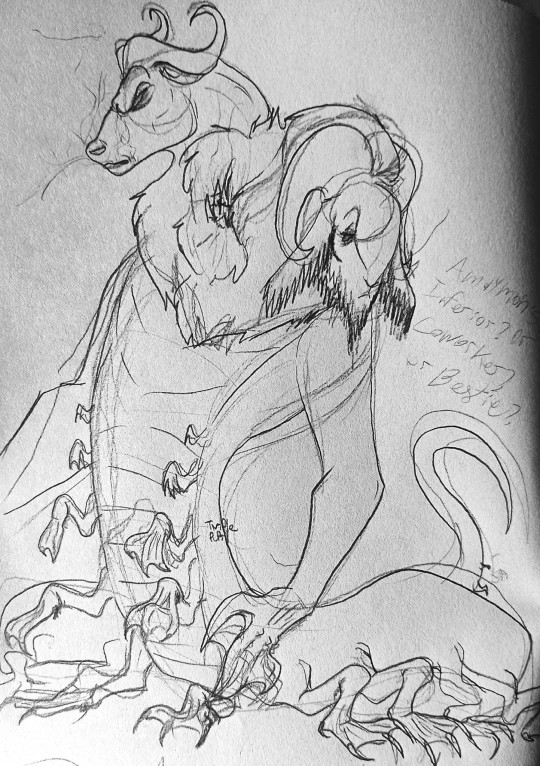
My personal interpretation of
King Asmodeus
Prince of Lust, Lord of sex demons, Nephillim, Amaymon's protégé, unofficial representation of Wrath and Sloth.
Each head expresses the extreme version of his current state of mind;
The Bull is wrath, desperation, impotence and other similar emotions. It tends to express the King's honest and brutal opinion on things and is the most comfrontational. It's mouth is hot as lava and can even spit fire.
The Ram is depression, hopelesness, compliance and nihilism. This head shows Asmodeus' more grounded, although pessimistic, views. It tends to defuse conflict, even through self destructing ways to lower tensions. Of course, it's also a big yes-man. It's mouth is ice cold like a corpse.
The human head is mostly a mystery, it has been dormant for a long time. It used to be awake in Ozzie's youth, but at some point after being caged in Hell, it's consciousness seemed to fade away. Ozzie's top clients say it's mouth is barely warm but soft enough to get the job done.
#I love him sm#My baby#I make him go through horrors because I love him#Also- his place as King of Lust was forced onto him but nowadays embraces the responsibility#Asmodeus oc#religious figures#tw religion#tw religious themes#demonology#biblical fiction#Also he hates fish and is a hopeless romantic- Seriously I have SO MUCH about him#cuphead au#somehow#my au#my shit#white backround#suggestive themes#because Lust and stuff#tw body horror#I did what I could with the design#To connect it with the Cuphead stuff--- The Devil bullies him frequently when they cross paths#bible fandom#bible fanart#Omg these are actual tags-#bible fanfiction#ig??????
25 notes
·
View notes
Text
On love and sacrifices
There’s so much more to this scapegoating business and big sacrifices referenced in the Good Omens narrative than the literal goats. And they’re only getting bigger, louder, final.
But let’s take it slow and start with the beginning, quite literally — i.e., with the Good Omens 2 title sequence. As we follow Aziraphale and Crowley on their journey, the universe warps and their usual left and right side positioning switches during the magic show (not accidentally an act of trust and sacrifice required both from the angel and the demon). They stay so throughout the next scene, which is their little dance in the air, and after they seemingly get settled on the A. Z. Fell and Co.’s roof and back to normal, the flipped sky in the background suggests that something’s not quite right yet. In the central part of the shot looms a large, humanlike shadow of the Elephant Trunk Nebula.
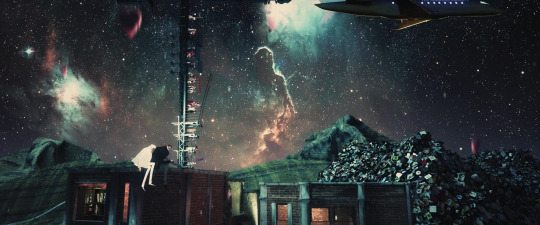
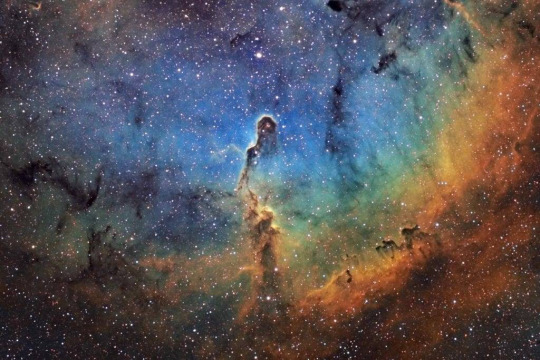
The nebula is a part of a constellation called Cepheus, after an Ethiopian king from the Greek mythology who agreed to sacrifice his only daughter in order to appease the gods and end a local calamity started by her mother and his wife, Cassiopeia (talk about generational responsibility). With time and a delightfully ironic twist of fate, the name of said daughter, Andromeda, became more famous than that of her father. Although she was chained up to a rock and offered to the sea serpent Cetus, the girl was spotted by the warrior Perseus, casually flying over the sea — either on the back of the Pegasus or thanks to a pair of winged sandals — after his victory over Medusa. He fell in love on the spot, defeated the serpent (with the help of a magical sword or Medusa’s severed head, depending on the varying sources), and freed the princess. That’s not exactly where their story ends, but we won’t be getting into the rest here.
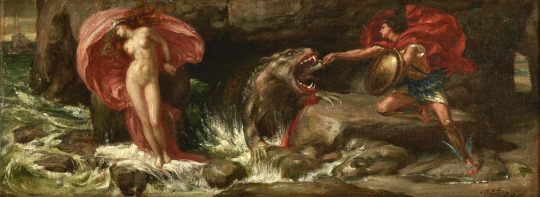
Not surprisingly, Neil has mentioned two parallel child sacrifice stories from the biblical context back in August. The first is one of the big ones — The Binding of Isaac. God's command to sacrifice Isaac, his only son, was a test of Abraham's faith. The angel of the Lord intervenes and provides a ram to be sacrificed in the boy’s place.
The second one isn’t nearly as popular, but you might have heard a variant of it in fairy tales or as the Law of Surprise invoked in The Witcher saga. In exchange for Israel’s victory over its enemies in battle, Jephthah had rashly promised God to repay the debt with the first thing seen on his return back home. The victorious warrior didn’t suspect to see his only child moving innocently "to meet him with timbrels and with dances" though. In horror, Jephthah covered his eyes with his cloak, but to no avail: ultimately, he was forced to honor his vow to God, and the girl was sacrificed. As grisly as it might look like in the Old Master’s paintings, it’s important to remember that human sacrifices weren’t limited to physical offerings only — Jephthah’s daughter might have been offered to God in the sense of officially shunning her family and dedicating her life to service instead, probably sequestered in a temple somewhere.
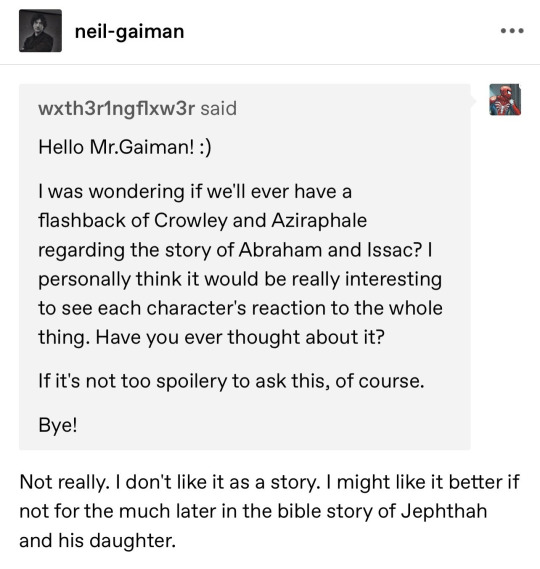
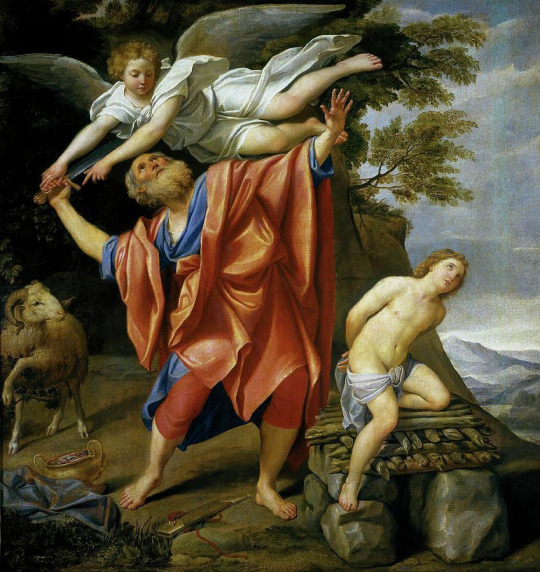
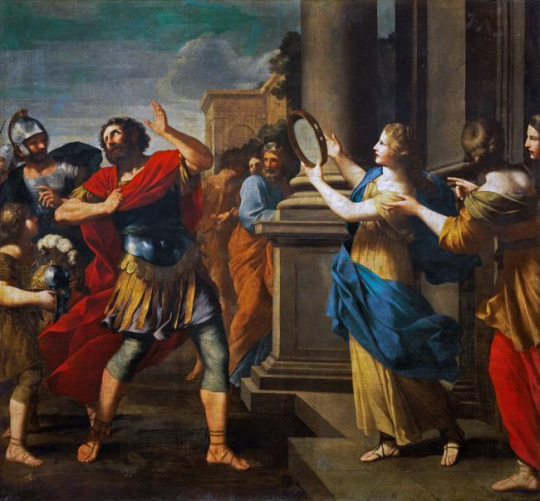
Interestingly, the main character of a big chunk of the Bible and the reason for the Second Coming happens to be THE most influential child sacrifice in the modern history. You know, a certain 33-year-old carpenter sent by his Heavenly Father to die on a cross for the sins of the mankind? Someone better call Aubrey Thyme ASAP.
Circling back to Aziraphale, he could be also seen as a representative of the concept of filial piety, since Eden willing to personally take a Fall not only for the humanity’s collective or individual transgressions, but the shortcomings of his Ineffable Parental Figure as well. Our favorite angel angel always fights for what is right and good, sure, but why would that be even a thing if God was truly omniscient, omnipresent, and omnipotent?
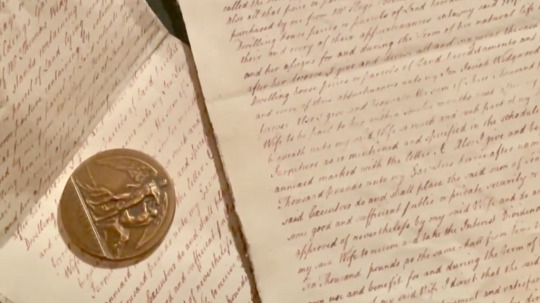

If Aziraphale’s medal is anything to go by, it looks like we might get an answer from the way it’s introducing another mythological narrative into the game, that is the story of Daedalus and Icarus. The most absorbing thing about this is the stark contrast to the recurring child sacrifice references for S3 mentioned in this post — Daedalus isn’t a father who wanted to sacrifice his son, it was his attempt to save him from imprisonment that ultimately drove Icarus to his death. The boy ignored his father’s explicit instructions, committing the grave and culturally universal sin of disobedience to one's parents that simply couldn’t go unpunished, one way or another.
But Icarus’s transgression could be seen both as high-flying ambition and striving for personal accomplishment as well as humanitarian sacrifice for knowledge and humanity’s advancement in general.
Similarly to a certain angel who left everything for what superficially seems like a work promotion, but is the ultimate act of love — both for his demon and the children they have been protecting and nurturing together for six thousand years. From the very Beginning, his white wings have been shielding everything he holds dear in this world.
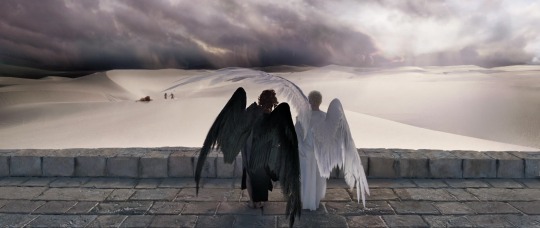
#happy easter#child sacrifice#greek mythology#bible fanfiction#good omens#good omens meta#never skip the intro#peter anderson studio#easter eggs#nebula#archangel michael approves#sword fighting with snakes#prince and the serpent#supreme archangel aziraphale#bamf aziraphale#aziraphale needs a hug#aziraphale#crowley#yuri is doing her thing#daedalus and icarus#cepheus and andromeda#abraham and isaac#jephthah’s daughter#god and jesus
131 notes
·
View notes
Text
I once tried to get my sister into watching good omens (unsuccessfully) and I told her it was about angels and demons.
She said “Eh, I’m not into that bible, Christianity stuff.”
And I replied with: “Weeellll, it’s about the Bible, buts it’s not at the same time.”
I had no need to share this, but I wanted to anyway.
29 notes
·
View notes
Text

Lovergirls
#good omens#azicrow#aziracrow#inaffable husbands#ineffable husbands#ineffable wives#anthony j crowley#aziraphale#wlw#angel crowley#bible fanfiction#good omemes#crowley#crowly x aziraphale#aziraphel
77 notes
·
View notes
Text

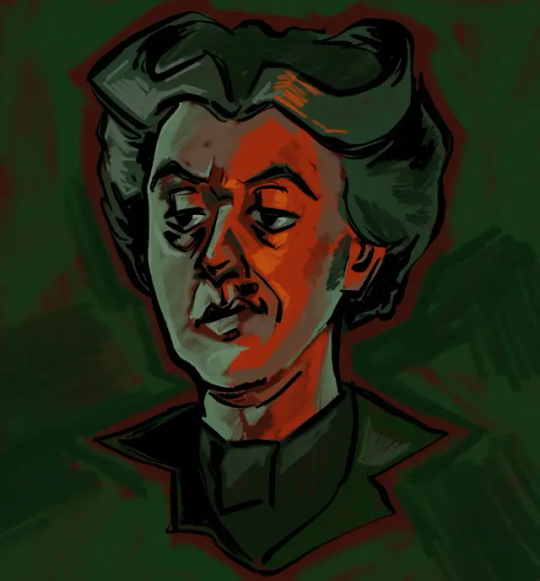
catboys rule the world, but in heaven they're having the most boring office job ever imagined
#furfur#renew good omens#good omens season 2#reece shearsmith#neil gaiman what are you doing in my falafel#catboy#fanart#good omens#my beloved#i still can't use the tags#queer#i <3 catboys#procreate#artists on tumblr#digital painting#digital illustration#bible fanfiction#furfur nation
85 notes
·
View notes